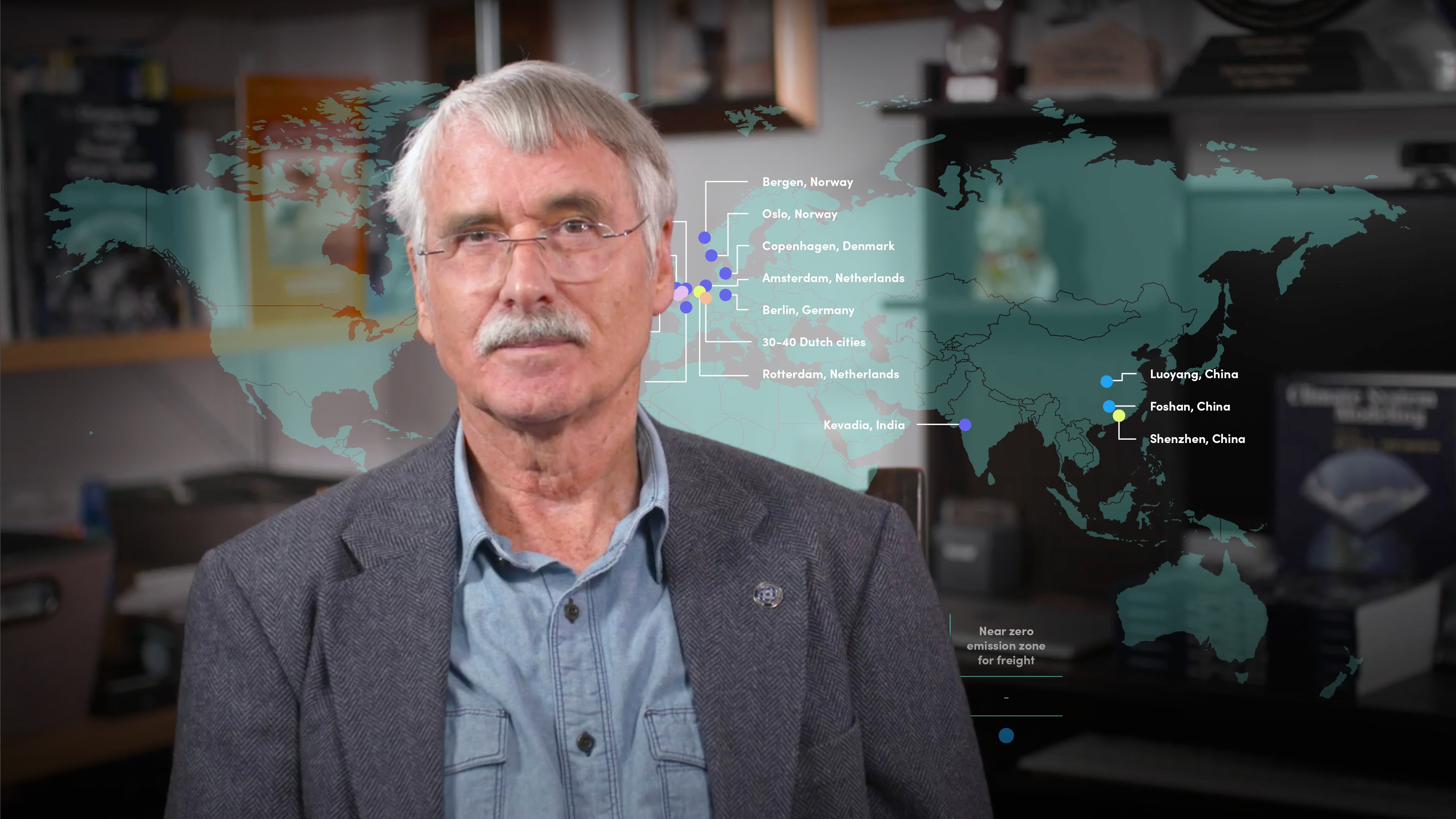
Global Response to the Climate Crisis

Kevin Trenberth
Former Coordinating Lead Author of the IPCC
The climate crisis is the biggest challenge humanity has ever faced. So you would expect the reaction to reflect this, right? Wrong. So far, the global response has been underwhelming. Join Kevin Trenberth in this video as he outlines what steps have been taken to mitigate climate change and whether or not they have been successful.
The climate crisis is the biggest challenge humanity has ever faced. So you would expect the reaction to reflect this, right? Wrong. So far, the global response has been underwhelming. Join Kevin Trenberth in this video as he outlines what steps have been taken to mitigate climate change and whether or not they have been successful.
Subscribe to watch
Access this and all of the content on our platform by signing up for a 7-day free trial.

Global Response to the Climate Crisis
14 mins
In 1992, the United Nations Framework Convention on Climate Change (UNFCCC) was signed by 154 nations. This was established with the goal to fight climate change, tracking progress in an annual Conference of the Parties (COP). This has led to the creation of the Kyoto Protocol which was replaced by the Paris Agreement, the main aim of which is to keep the global average temperature to well below 2°C above pre-industrial levels. However, the UN framework requires a unanimous consensus and works largely through peer pressure and goodwill. Mitigation efforts to-date have been somewhat beneficial but have not come close to reducing the rate of increase of greenhouse gases in the atmosphere. With regards to mitigation, the main goal is to decarbonise the economy. People most affected by the climate crisis hugely support policies to become more sustainable but in general, the national and international framework is inadequate.
Key learning objectives:
Identify the goals of the UNFCCC
Outline the advantages and disadvantages of the global commons response
Understand public opinion on climate change policies
Subscribe to watch
Access this and all of the content on our platform by signing up for a 7-day free trial.
What is the United Nations Framework Convention on Climate Change (UNFCCC)?
The UNFCCC is an multilateral environmental agreement, established with the goal to fight climate change by “stabilising greenhouse gas concentrations in the atmosphere at a level that would prevent dangerous anthropogenic interference with the climate system”. To track and implement progress, the UNFCCC set up the supreme governing body as the Conference of the Parties (or COP), which meets annually.
What are Annex I countries?
These are industrialised countries were expected to take the lead on UNFCCC targets, as having been the primary cause of the climate crisis problem.
What is the Kyoto Protocol?
It was designed to limit carbon dioxide emissions and other greenhouse gases from developed countries. The USA and Australia did not initially ratify this (although Australia came on board in 2008). In particular, it did not impose restrictions on developing countries and this meant that while some progress was achieved, especially in Europe, it was undermined by rapidly industrialising countries such as China. It was ratified at COP3 in 1997.
What is the Paris Agreement?
The Paris agreement supersedes the Kyoto Protocol, named for the city that hosted COP21 in late 2015, where the accords were negotiated. The aims are:
(a) Holding the increase in the global average temperature to well below 2°C above pre-industrial levels and to pursue efforts to limit the temperature increase to 1.5°C above pre-industrial levels
(b) Increasing the ability to adapt to the adverse impacts of climate change and foster climate resilience and low greenhouse gas emissions development, in a manner that does not threaten food production;
(c) Making finance flows consistent with a pathway towards low greenhouse gas emissions and climate resilient development
What are the disadvantages of the UNFCCC response?
It was a powerful statement, but not much more. The UN framework requires a unanimous consensus and works largely through peer pressure and goodwill. As it’s voluntary, it is toothless. There are no penalties for not reaching commitments or failing to follow the agreement (e.g. the US withdrawing in 2017 before rejoining in 2021). Nor is there compensation for damage or loss.
What does mitigation mean?
Mitigation refers to slowing or stopping the emissions of greenhouse gases and therefore limiting the nature of future changes.
What does adaptation mean?
Adaptation refers to assessing impacts now and in future, assessing vulnerability, building resilience and planning sensibly for the expected changes. As well as generally coping with the expected changes, including extremes thereby adapting to the changes as they come along.
How well have mitigation and adaptation efforts worked?
To-date, efforts have been somewhat beneficial but have not come close to reducing the rate of increase of greenhouse gases in the atmosphere. Some adaptation efforts have been spectacularly successful (notably the loss of lives in cyclones in India and Bangladesh through early warning systems), but most have not.
What are some examples of mitigation efforts?
Many cities globally have implemented low emission zones, where polluting vehicles are restricted or deterred, to improve air quality. Transitioning internal combustion engines in vehicles to electric, as well as expanding electric bicycles and scooters have helped transportation problems.
One of the largest joint mitigation projects has been creating “net zero” goals. This means cutting down our net greenhouse gas emissions to zero, or as close to zero as possible by 2050, which means if emissions continue they must be offset in some way. A coalition of nations, cities, businesses and institutions involving 70+ countries (including the US, the EU and China) have committed to net zero although with some, like China setting the goal at 2060. This represents a whopping 76% of global emissions.
What are the world's most popular climate policies?
In the United Nations Development Programme paper “The Peoples' Climate Vote” the world’s most popular climate policies are as follows:
1. Conserving forests and land
2. Using solar, wind and renewable power
3. Using climate-friendly farming techniques
4. Investing more in green business and jobs
5. Using more green electric cars and buses, or bicycles
How have political and value systems changed over time?
The fossil fuel divestment movement, aimed at persuading investors to stop pouring money into the fossil fuel industry by applying social and political pressure, has grown even faster than any other divestment movement, according to the University of Oxford. Stand.Earth says that over 1,400 institutions with assets over $39 trillion US dollars have committed to divesting.
Youth engagement on climate change has been powerful. The longest standing such effort is “Juliana vs the United States” led by “Our Children’s Trust” which filed a court case in 2015 against the US government, on behalf of 21 youths aged 8 to 19 years old. Newer movements such as “School Strike for Climate” are taking the world by storm, started by one 15 year old: Greta Thunberg.
Subscribe to watch
Access this and all of the content on our platform by signing up for a 7-day free trial.

Kevin Trenberth
There are no available videos from "Kevin Trenberth"





























